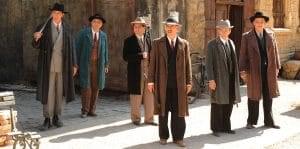
World War II is over and David Bermann (Moritz Bleibtreu), an ex-concentration camp prisoner, is trying to get his family’s linens business up and running again. During the war, the Nazis trashed the elegant store, being a Jewish owned business, and he and his brothers were eventually taken prisoner. Now he’s having difficulty getting his citizenship paperwork approved by the authorities. A no-nonsense Investigator, Sara Simon (Antje Traue), grills him about his activities in the camp, demanding to know why he received preferential treatment. She works for the Allies, helping to interrogate and route out Nazi collaborators.
We flashback to scenes in the camp as Bermann recounts his story. It seems that Bermann is quite a wit, a characteristic that could have gotten him killed, but instead saved his life. Prison camp commander Otte (Christian Kmiotek) is so impressed that he assigns him to a special mission. He is to coach Hitler in telling jokes. It seems that the Fuhrer is a bit humor challenged — who knew? Mussolini, however, is a real card, and the Nazi leader is loathed to be second in the funny department to El Duce. This story thread, however, never plays out for reasons that are explained later in the film.

“…grills him about his activities in the camp…and route out Nazi collaborators.”
Meanwhile, back in the present, Bermann gathers a troupe of peddlers who go door to door selling his linens. They dream up a number of schemes to get Germans to buy their wares, such as pretending to be friends or army comrades of men who died fighting for the Third Reich. Once the peddlers get a foot in the door, the families are putty in their hands. While this sequence offers some comic relief, it feels out of balance with the rest of the story. It’s as if the producers couldn’t quite decide between humor and tragedy.
The film’s overall atmosphere is steeped in nostalgia, which in this case means that most of the folds and wrinkles have been airbrushed out. Virginie Saint-Martin’s cinematography is a delight to look at. From the fragments of shattered buildings that line the streets to the large, bare office, probably once crammed with German military officials and now occupied by the American investigator, each shot is stunning in its color, detail, and composition. Ditto for the detailed costumes. It’s the kind of period piece that European craftspeople excel in creating. It looks great if a little too perfect. We aren’t looking at a faithful recreation of the past, but instead a slightly filtered facsimile. As we hear Bermann recount his story, we’re left wondering if something dark lingers in his past—and whether he’s filtering out any incriminating parts of his personal history. We eventually get our answer, but it’s a bit of an anti-climax when it arrives. By that time we’re already pretty sure how we feel about Bermann.

“…steeped in nostalgia, which in this case means that most of the folds and wrinkles have been airbrushed out…”
Unfortunately, the film doesn’t fully carry the weight that director/writer Sam Garbarski and co-writer Michel Bergmann seem to be aiming for. The characters appear to grapple with emotional issues, but the film doesn’t delve very deeply into them. One of them is survivor guilt, which some of Bermann’s peddlers mention only in passing. Bermann dismisses the notion. The important thing is for survivors to carry on. Hitler is dead, but we’re still here, he tells his employees.
In the end, the story goes soft, and ties up its loose ends a bit too completely with a happy, wistful conclusion. It seems that much of Bermann’s staff of salesmen are America bound. But he knows where his place is, which is right where he started. He’s got a family tradition to carry on.

Bye Bye Germany (2017) Directed by Sam Garbarski. Written by Michel Bergmann, Sam Garbarski. Starring Moritz Bleibtreu, Antje Traue, Tim Seyfi, Mark Ivanir, Anatole Taubman.
5.5 out of 10
